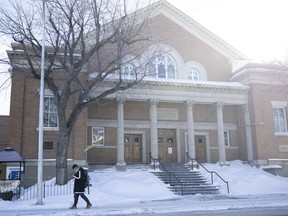"This is beneficial to the community economically. It's beneficial from a conservation point of view and it ultimately improves the tax base by rehabilitating vacant buildings."

Article content
A consultant hired to review Regina’s Heritage Building Rehabilitation Program says more financial incentives now will benefit everyone in the long run.
Advertisement 2
Article content
“This is beneficial to the community economically. It’s beneficial from a conservation point of view, and it ultimately improves the tax base by rehabilitating vacant buildings,” Donald Luxton, of Donald Luxton & Associates, said during an executive committee meeting Wednesday.
Based in Vancouver, Donald Luxton & Associates offers consulting services in cultural and heritage planning. On Wednesday, Luxton presented the firm’s review of Regina’s program as well as a number of recommendations for how the city can make it more effective.
With an in-depth knowledge of Regina, its current heritage policies and building inventory, Luxton answered questions from the committee with enthusiasm and ease, seemingly eager to pave the way for a new and improved program for the sake of heritage conservation.
At the top of the list of changes is the expansion of financial incentives offered to property owners to aid in the rehabilitation and conservation of heritage buildings.
“There is ultimately a net economic benefit to everyone involved,” Luxton said when asked how a financial investment now can benefit the city in the long term. “In the City of Victoria they’ve been tracking heritage homeowner grants for 40 years now and there’s, in general, a 29 per cent increase above standard building stock for maintained heritage properties.”
He said the right owners come forward for the right buildings because they see the potential to use financial incentives and work with the city on an ongoing basis. Based on the firm’s experience in other cities, Luxton also said people tend to spend at least 10 times as much as they receive in incentives.
Advertisement 3
Article content
According to a report from city administration, the existing program provides up to 10 years of tax exemption or 50 per cent of eligible conservation costs, whichever is less. A cash grant of up to $50,000 is currently available but only to tax exempt properties such as churches.
Changes to the program would see a a single intake date for applications each year to allow for prioritization and financial planning for the following year. It would also significantly expand the use of cash grants to incentivize conservation with new eligibility criteria including all properties, not just those that are tax exempt. The budget would be increased from $30,000 annually to $150,000 in 2022, and then $250,000 beginning in 2023.
Eligibility criteria for all incentives would also be expanded to include Heritage Inventory properties (not yet officially designated as a heritage building), but at a lower level of funding or percentage of total eligible costs. Additional maintenance grants to help fund routine work and prevent deterioration is also being recommended. Luxton noted increased incentives will help reduce the number of “demolition by neglect” situations.
While some city councillors voiced concern over whether or not the city could afford these changes, Luxton said the investment will pay itself off, but the approach being recommended is also a “start small and grow” approach which has proved viable in many other jurisdictions across North America.
Advertisement 4
Article content
“We see always the need for assessment over time, for monitoring as to what initiatives are most effective and if necessary adding more incentives as you go,” Luxton said.
Also among the proposed changes is the removal of the city’s grading system of heritage properties. Currently the city classifies historic places as Grade 1 (city-wide significance) or Grade 2 (neighbourhood-wide significance). Although initially planned for a later phase in the program’s revamp, Coun. Bob Hawkins (Ward 2) moved an amendment to see the change come in the first phase.
“Grading systems ultimately diminish historic places not in the highest tier and can create confusion among City officials, staff, and the public about their heritage values and expectation of conservation” administration’s report said.
Initially intended to remove conflict around the designation of heritage properties when owners are reluctant, administration said Wednesday it has not helped, especially where there is varying opinions on the heritage significance of a building.
The plan was endorsed by Heritage Regina, Nicor Group which specializes in heritage restorations, and got a unanimous support from executive committee on Wednesday. It goes to council next week for a final vote.
Report says more financial incentives needed for heritage conservation - Regina Leader Post
Read More

No comments:
Post a Comment